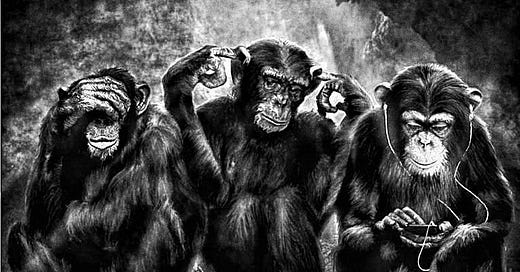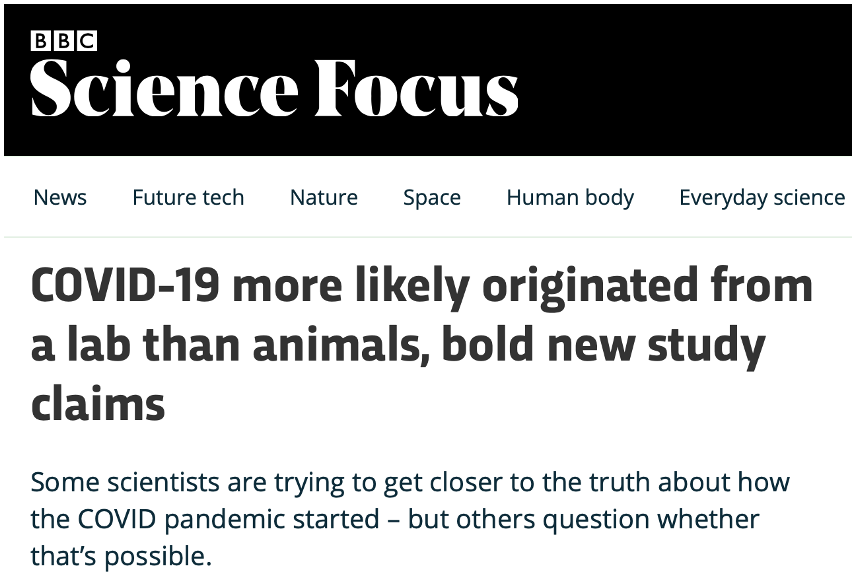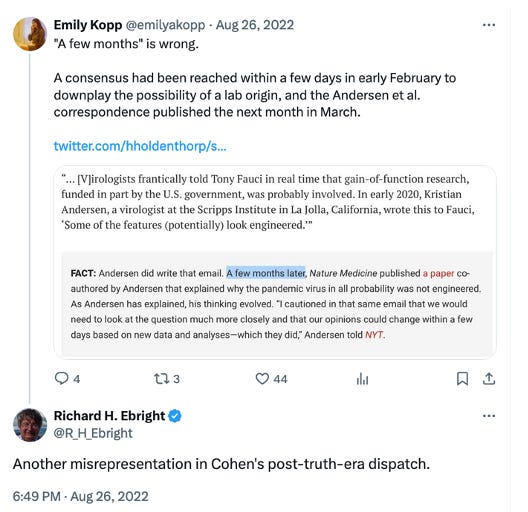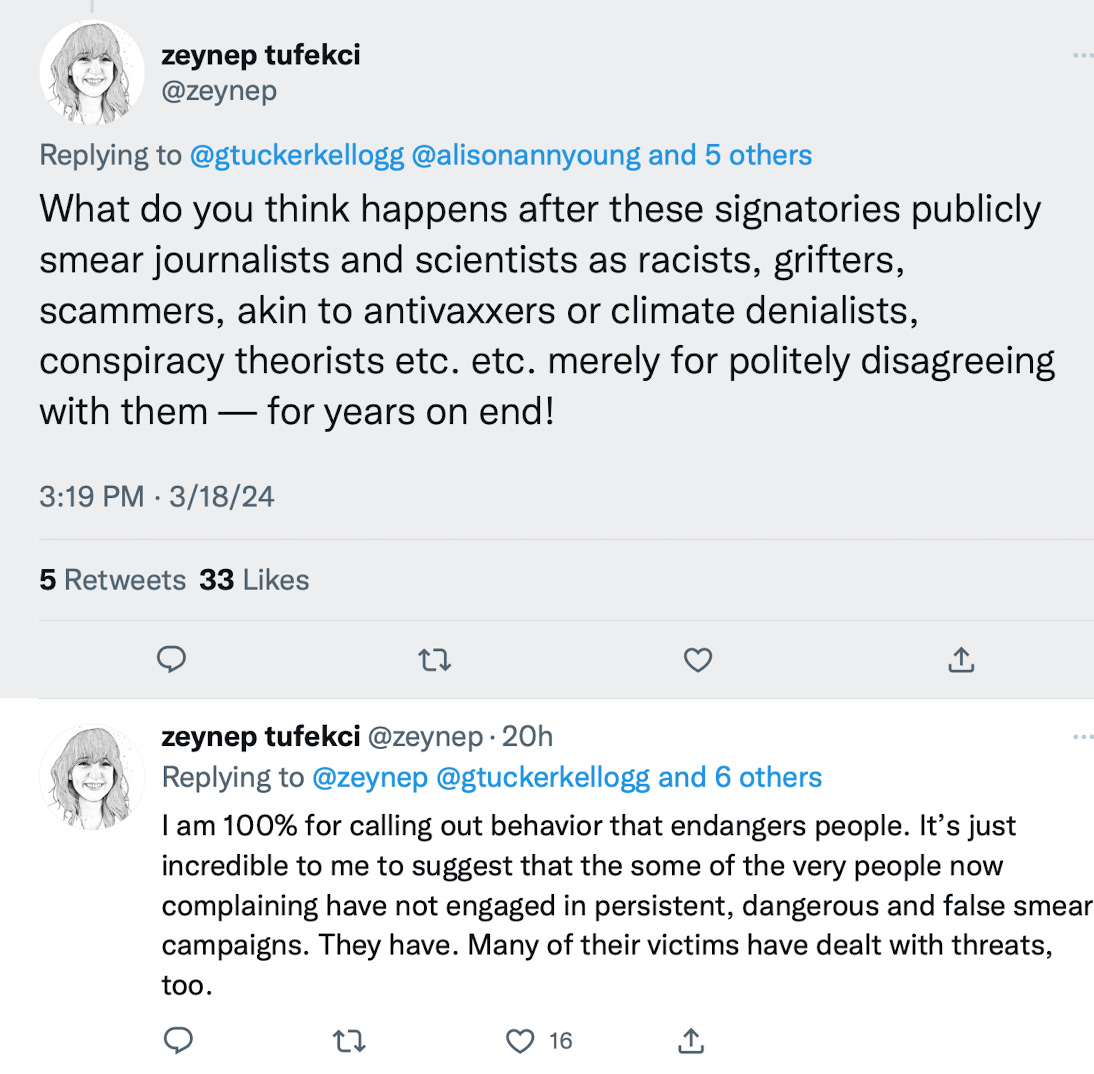Science Magazine Reaches New Low, Defames Their Critics
Collaborating with their friends in biodefense virology, Science Magazine vomits up a malicious hit piece to attack and silence researchers pointing out scientific fraud and misconduct.
8 minute read
“Science reporting isn’t really journalism,” he said, a grin spreading across his face.
“Oh, fuck you,” I replied.
It was a weekend night, and I was seated at the Post Pub—a dingy burger spot, frequented by Washington Post reporters—with some of the most respected journalists in the United States, Washington Post reporters who had won top awards for investigations that had sent politicians to jail, freed the wrongfully convicted from prison, and crashed the careers of corrupt leaders. I had been invited to join the esteemed crew that night for beers and burgers, but his jibe about science reporters wasn’t just directed at me, it was also an obvious stab at two of his colleagues: Post science reporters Rick Weiss and Joel Achenbach.
“You guys don’t do reporting,” he continued. “You just get press releases and write them up to make scientists and their science organizations happy.”
The Post reporter sitting next to him giggled, nodding her head in agreement.
“You still hungry?” I asked, wadding up a napkin. “Eat this,” I said, tossing it at his face.
The conversation was in good fun, and several beers into the night, but the joke’s undercurrent stuck with me because journalists at the New York Times and the Wall Street Journal have made similar comments to me over the years. Most reporters don’t see science writers—even science writers that work at their own media outlet— as journalists. They view them as science cheerleaders.
Three cheers for science!
Science Magazine provided another example of science cheerleading last week, when science writers Jocelyn Kaiser and Jon Cohen defamed and attacked their own critics, posting a fact-addled hit piece to malign Rutgers University researchers Bryce Nickels and Richard Ebright, who have pointed out research fraud and dishonest reporting at Science Magazine.
To defame Nickels and Ebright, Kaiser and Cohen copy and pasted accusations leveled at the Rutgers researchers by 12 biodefense scientists, several of whom Science Magazine has promoted in their pages, even though some of these virologists have been accused of scientific fraud and misconduct in a statement signed by over 5,300 petitioners.
Kaiser and Cohen’s article quoted a complaint from Scripps researcher Kristian Andersen about Ebright and Nickels: “I would much rather that we get back to proper scientific discourse where we can agree and disagree.”
Kaiser and Cohen failed to note that Andersen has a long history of bullying researchers, as first documented in a 2022 Vanity Fair article, and that the Intercept caught Andersen misleading under oath before Congress about an $8.9 million federal grant he received to conduct virology research.
But Science Magazine’s desperate attempt to silence Nickels and Ebright blew up in its face within hours, when it was forced to retract false portions of the defamatory story that accused Nickels of calling his critics murderers.
So facts reported by Science Magazine deviated from the facts, a somewhat consistent theme in science writing.
Hypocrite much?
But it gets better.
Kaiser and Cohen’s disregard for the truth was immediately seized on by several researchers and New York Times columnist Zeynep Tufekci, who tweeted to Science Magazine’s Kaiser that the scientists complaining about Nickels and Ebright had themselves engaged in years of harassment.
Hypocrite much?
Journalism professor and pandemic book author Alison Young also chimed in, pointing out that Science Magazine had a duty to report on the behavior of the biodefense scientists who sent the complaint about Ebright and Nickels. “The complaint was about social media behavior and the social media behavior of the letter’s authors was highly relevant and deserved reporting,” Young tweeted, while tagging other journalists.
Science Magazine’s PR campaign
Almost from the pandemic’s beginning, Science Magazine has sided with Anthony Fauci and virologists he funds who deny that colleagues at the Wuhan Institute of Virology might have had a lab accident. In the pandemic’s first month, Jon Cohen reported for Science Magazine that “most researchers say” the pandemic virus did not come from a lab.
“The viral sequences, most researchers say, also knock down the idea the pathogen came from a virology institute in Wuhan,” Cohen wrote in a January 31, 2020, Science Magazine piece.
Emails show that Cohen’s claim was totally false.
“[S]ome of the features (potentially) look engineered,” wrote Kristian Andersen, the day after Cohen’s article, in an email to Anthony Fauci.
Fauci then sent an email detailing what most of the world’s leading virologists told him on a phone call: Mutations in the COVID virus do not appear to be natural, and virologists were suspicious that a mutation was inserted. Virologists were also worried about Wuhan scientists doing dangerous gain-of-function research.
When I asked Cohen about his reporting, he emailed, “Andersen and Fauci did not share these concerns with me at the time, and if they had—and I wish they had—I certainly would have quoted them saying as much.”
Since Cohen’s email to me, he has done nothing to correct the record on his dismal, misguided reporting. Instead, he helped use a letter signed by Andersen and other virologists to attack Nickels and Ebright, two of the biggest critics of Science Magazine’s reporting and a study published by Cohen’s friend … Kristian Andersen.
How do we know Cohen and Andersen are buddies? This also came out in emails.
Last March, Ashley Rindsberg reported in Tablet that a whistleblower alerted Cohen to possible fraud in a study on the pandemic’s origin published by Kristian Andersen and other virologists. Instead of reporting on the tip, Cohen dimed out the whistleblower and forwarded the allegations on to Andersen and other virologists: “Here’s what one person who claims to have inside knowledge is saying behind your backs …”
Three Wise Monkeys of Science Magazine
“Confirmation bias can influence which stories editors and journalists decide are likely to be worth reporting,” noted a recent report at Harvard’s Shorenstein Center.
A glimpse through the reporting at Science Magazine makes clear that they seem little interested in any evidence that makes biodefense virologists look bad or that questions their studies that find the pandemic started in wet market, not a lab.
It's as if the place is being run by the Three Wise Monkeys: see no evil, hear no evil, speak no evil.
On the day Kaiser and Cohen reported that biodefense scientists don’t like Nickels and Ebright, they very studiously ignored a new peer-reviewed study that undermined Science Magazine’s own research and found a natural origin for the pandemic was not likely.
The BBC picked up the story instead.
Nor did Kaiser or Cohen see, hear, or speak evil of virologists’ research, when scientists published a study in a British journal that found a Science Magazine study that pointed to a market as the origin of the pandemic is “invalid” and based on “flawed” statistics.
However, this new research was reported on in the German press. The weekly science magazine Spektrum reported on the new research, and the German newspaper Frankfurter Allegemeine forced Science Magazine to correct part of their study, and reported it was an example of “careless and unprofessional handling of statistical methodology.”
Kaiser and Cohen then went blind, deaf and dumb when the investigative nonprofit U.S. Right to Know released new internal documents that showed virologists planned to construct viruses from sections of lab-synthesized DNA. Researchers had predicted this might have happened if SARS-CoV-2 had been generated in a lab.
Kaiser and Cohen also played the Three Wise Monkeys last December when US Right to Know released documents showing that virologists and Wuhan researchers attempted to mislead the Defense Department’s DARPA program about dangerous virus research in a 2018 grant called DEFUSE. DARPA rejected the proposal as some of the studies involved dangerous gain-of-function studies.
“It’s become a pandemic truism,” I reported on the documents, “that researchers and their pet science writers eventually get caught dissembling, when documents take the air out of authoritative statements and convictions underlined with purported scientific and journalistic authority.”
What the documents showed is that Jon Cohen had falsely accused reporter Nicholas Wade of misleading Congress in a hearing, and he also bullied me for pointing out that one his favorite virologists had lied during a debate Cohen hosted about dangerous virus research being done in Wuhan.
Cohen’s boss at Science Magazine, Holden Thorp, was also caught misleading readers about the type of research happening in Wuhan. When I threw the story up on X, Nate Silver noted that science writers had helped virologists hide the dangerous research they were doing.
Dan Engber at The Atlantic, also took notice of the new documents that Science Magazine ignored.
On a final note, it escaped Kaiser and Cohen’s vision and hearing when Kristian Andersen lied to Congress about $8.9 million grant proposal that was sitting on Anthony Fauci’s desk while he was writing a paper for Nature Medicine that exonerated a lab Fauci was funding in Wuhan. (Note to readers: last month, Nickels delivered a petition, with 5,300 signatures, to Nature that asked them to retract Andersen’s Nature Medicine paper.)
“Based on the actual timeline of this grant,” Andersen testified before Congress, “It is not possible that the merit-based federal grant awarding process was influenced by a call [with Anthony Fauci] in February, 2020.”
As the Intercept reported, Andersen’s statement was false and Fauci gave final sign off for Andersen’s grant months after Andersen published his Nature Medicine paper exonerating Fauci.
So why did Science Magazine show interest in this letter signed by Andersen when he has such a tattered history?
“The story was newsworthy because a complaint was officially submitted to a university, the first time to our knowledge that multiple scientists have made such serious allegations in course of this dispute,” Kaiser emailed me. “The complaint made the story, not bad behavior more broadly from some scientists on the two sides”
However, criticism of Science Magazine by Nickels and Ebright might have greased the editorial skids, helping ease the story into Science Magazine.
After one of Cohen’s sloppy pieces in the summer of 2022, Ebright accused him of “post-truth.”
Ebright later accused multiple science writers, including Jon Cohen, of being a “stooge” for constantly regurgitating new claims that the pandemic started in a market.
Bryce Nickels has also criticized Cohen’s penchant for biased reporting.
Of course, criticizing a science journal isn’t cause for that journal to partner with biodefense researchers who have smeared journalists and scientists for disagreeing with them on social media. But that’s an issue for ethics in journalism. And science writing just isn’t really journalism. Is it?

















Thank you for this Paul. Am I naive to think that the lab leak will become a fait accompli? The science world is so very dirty. Makes me wonder how much great science got smeared and spat and pissed on. Witness the seamy dart throwing Alex Washburne is enduring. Why are so many scientists so willing to bury their integrity? I wonder what’s going on in their lives?
Is it true that Science will be changing its name to "Sciencey"?